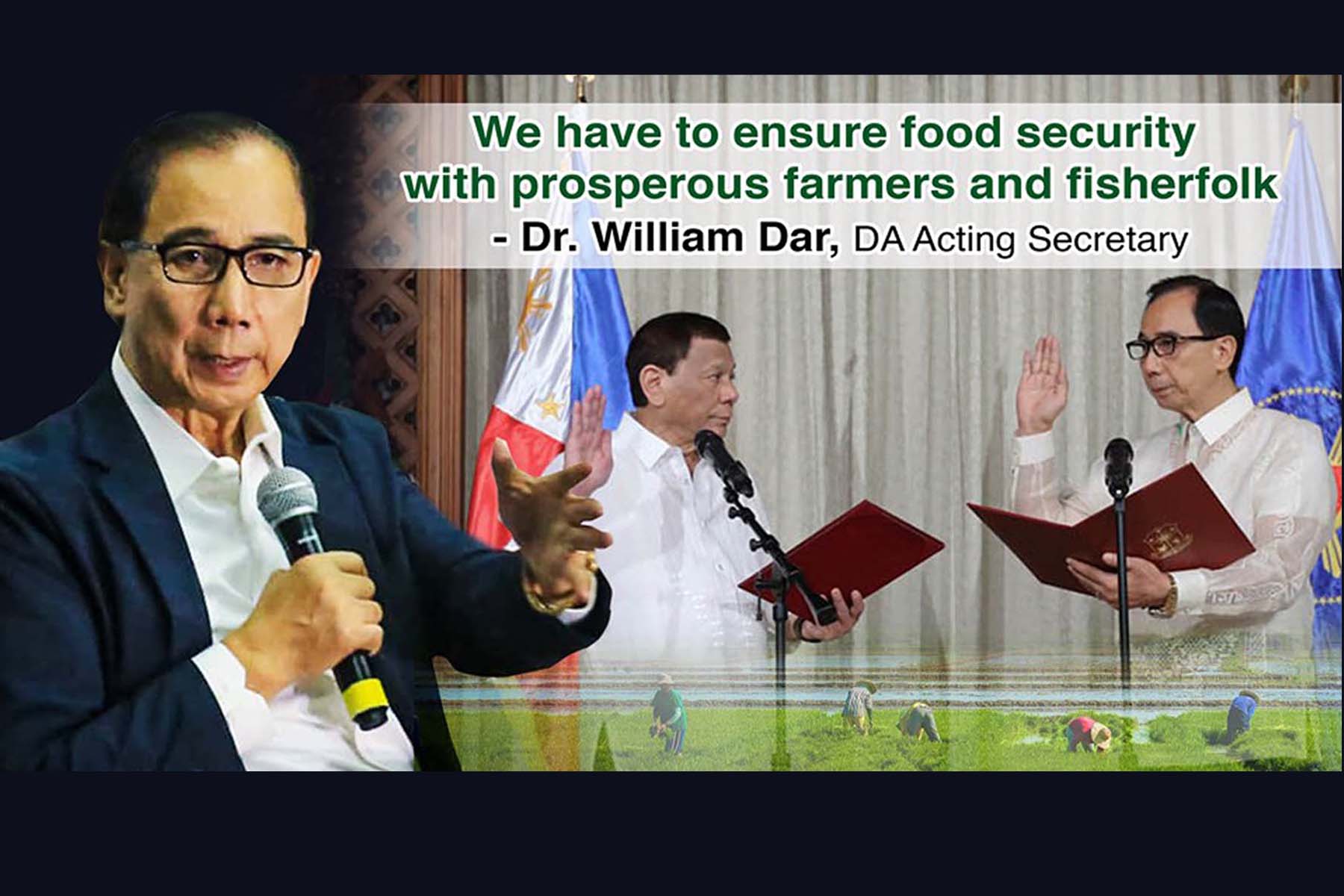As he seat as the new Department of Agriculture Secretary, Dr. William Dar presented his priority concerns in his first 100 Days.
1. Ensure the proper and efficient implementation of the Rice Tariffication Law, particularly the management of the P10-B Rice Competitiveness Enhancement Fund (RCEF) including that of the formulation of the Rice Industry Roadmap.
2. Craft and implement a “Crop Diversification Strategy” with corresponding fund requirements, initially using current DA program budget, and thereafter included under the 2020 and 2021-2022 annual budgets.
3. Craft and implement a “Pantawid Magsasaka Program” that will provide continuous assistance to adversely affected rice farmers due to the rice tariffication regime.
4. Enhance skills of small farmers and fisherfolk, with emphasis on entrepreneurship.
This includes empowering small farmers’ and fisherfolk’s cooperatives (SFFCs), irrigators’ associations (IAs) and agrarian reform beneficiaries’ associations (ARBAs). They should be trained on entrepreneurship and financial management. DA should forge MOAs with major agribusiness companies that will provide business managers who will train SFFCs, IAs and ARBAs on how to profitably run their farm, fishery and agribusiness enterprises.
5. Strongly implement climate change and disaster risk reduction program. This includes institutionalizing early warning systems and protocols, such as typhoon and flood readiness, harvesting of crops using combine harvesters and storing them in all-weather, earthquake-proof and elevated sturdy warehouses.
6. Assist BARRM in implementing its agriculture, fishery and agri-entrepreneurship development program.
7. Introduce “New Thinking” as the revised DA vision and mission, like strive to attain: a “food-secure” Philippines teeming with prosperous farmers and fisherfolk; identify and promote “countryside heroes” that include successful farmers, fisherfolk, farmers’ and fishers’ groups; establish and strengthen a farmers’ and /fisherfolk’s registry to serve as basis for granting social benefits like SSS, Philhealth, etc.
8. Sustain massive information and communication campaign, highlighting countryside heroes.
9. Review and re-orient existing DA programs and projects towards increasing productivity, competitiveness and income.
10. Reshape and reprogram budget of DA for 2020.
11. Enhance partnership with the private sector particularly in forging contract-growing and marketing agreements, and training of SFFCs, IAs, and ARBAs on agribusiness, entrepreneurship, financial and marketing.
Such private groups include the Go Negosyo of PA Joey Concepcion, Philippine Chamber of Commerce and Industry, the Fil-Chinese CCI (chaired by Henry Lim), Management Assn of the Phils. (MAP), and multinational agribusiness companies (SMC, JG Summit, MVP Group of Companies, etc.).
12. Strengthen the organizational structure of DA including systems and processes for efficient and effective governance.
This includes energizing the provincial and municipal agriculture offices (PAOs and MAOs) and their technicians.
13. Conduct “Food Summit” with key stakeholders: farmers, fisherfolk, GOs, NGOs, LGUs, private sector, SUCs, others.
This includes strengthening the SUCs, mobilizing them to train farmers, fishers and rural entrepreneurs, as well as for lending technical assistance in extension work in close coordination with DA Regional Offices and the provincial LGUs.
DA should provide SUCs budget for such activities.
14. Coordinate/collaborate with DTI regarding price stabilization and complementation of agricultural products as well as strengthening quarantine measures against poultry and livestock diseases like the African swine fever.
15. Review restrictive and constrictive policies on agriculture, fishery, agribusiness, credit, etc. For instance, the possibility of lifting the ban on export of mature coconuts and corn.


